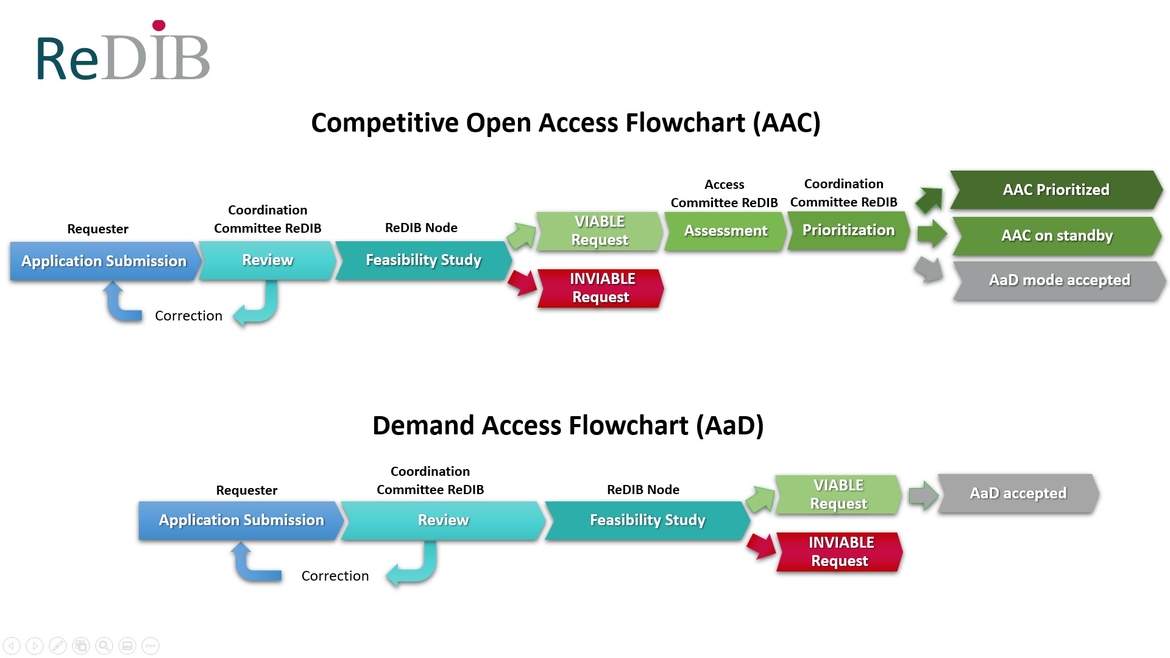1. MECHANISMS FOR ACCESS TO UNIQUE INFRASTRUCTURES
They are available to the entire scientific community, national and international, public and private sector, who can access them under the modalities of Competitive Open Access (CAA) or Access on Demand (AoD).
Competitive Open Access (CAA)
Subsidized access mechanism to ReDIB's essential facilities, which will be granted to applicants based on objective criteria of merit and free competition among the different AAC applications received in each call (see "REDIB-02-PDA Access Protocol" in the Documentation section of this website).
Requires evaluation by the ReDIB Access Committee (see "REDIB-01-RCA Access Committee Regulations" in the Documentation section of this website).
Applications for this type of access can only be submitted within the deadlines established in the AAC calls opened by ReDIB, always through its website. Access to the call.
Access on Demand (AaD)
Unsubsidized access modality, in which the rates approved for the different services of the nodes are applied.
It does not require evaluation mechanisms to ensure merit and free competition among applicants, but only a study of its technical feasibility in the node involved.
Applications for this type of access can be submitted at any time, through the ReDIB website or directly at the ReDIB node involved.
2. FEASIBILITY
In order for a request, whether for AAC or AaD, to be approved, it is necessary to ensure that ReDIB can technically undertake the requested experimentation. Therefore, applicants must first consult with the ReDIB node involved.
3. APPROVAL
AaD requests only require for approval the evaluation of their technical feasibility by the ReDIB node involved.
AAC requests must be previously evaluated by the ReDIB Access Committee.
Applications that are part of R+D+i projects funded by a competitive call from an international or national funding agency will have a favorable evaluation of their scientific-technical quality, and will therefore be automatically approved as AAC.
All AAC applications are evaluated by the Access Committee on the basis of quality and relevance criteria:
- Scientific and technical relevance of the proposal and its basic project.
- Timeliness/impact of the proposal.
- Exploitation and dissemination of results, publications, previous contribution and expectations.
- Adequacy of the proposal to the strategic lines of ReDIB.
4. PRIORIZATION
Based on the individual scores obtained in the evaluation, a Prioritized List of the applications with approved open access is drawn up, grouped by nodes and/or essential facilities, being:
- AAC accepted: proposal accepted and with assigned access time.
- AAC on hold: proposal accepted but without assigned access time. They could finally have access in the event that access time will be released due to cancellation of applications qualified as "AAC accepted". For this purpose, a prioritized waiting list will be available according to the score obtained in the evaluation process.
- AAC rejected: proposal rejected in AAC.
- Reassigned to AaD: proposal reassigned to be executed through Access on Demand.
The following flowcharts summarize the processing of applications in both modalities, AAC and AaD.


 Distributed Biomedical Imaging Network
Distributed Biomedical Imaging Network
